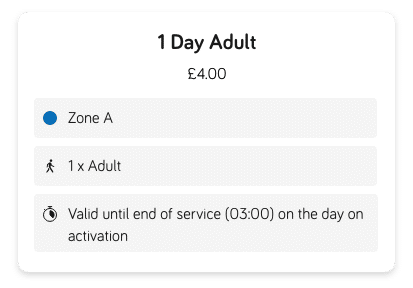Making ticket purchase easier for new customers
Giving more information up front to the new customers that are attracted to use the bus for the first time over the coming months.
29th Dec 2022


In the early days of mobile ticketing, it was clear that not all passengers understood how buses worked when they bought and activated a ticket from their mobile phones. Entirely understandable when you think about how apps have opened up so many new things to us over the last 10 years. Buses are infinitely more accessible when those unfamiliar with them can research and engage with them well before they step foot on them for the first time.
Day tickets would be purchased and activated at all times of day, from early morning all the way through to late in the evening. Those activating late in the day often felt less satisfied with their purchase than those getting a full day of travel for their hard-earned. The consternation caused came from customers feeling aggrieved that the day ticket they thought they’d bought was actually not really a day, but in fact the remainder of today – until the buses stop running – sometime after midnight.
Various solutions ensued by providers, including pop-up alert messages to warn customers before they activated a ticket, that they would only get the rest of the day if they did it right now. But even this was after the fact. After the point at which they’d purchased the ticket without fully understanding its constraints.
For one particular customer, this was a bridge too far. They complained not only to the customer service team at the bus company but to the Advertising Standards Authority. This is not unusual for transport season tickets of course, and it’s the way it’s been done for years but they claimed that they had been mis-sold. And sure enough, the complaint was upheld by the ASA. The operator comments:
“The ASA felt we were not specific enough in our ticket descriptions as to how long the ticket would last once activated – Largely as we base expiry for most of our tickets on calendar days rather than hours and minutes. There is an “Are you sure” pop up on the app telling someome when the ticket would expire if they continued with the activation process. We felt this was enough to make clear to passengers when their ticket would expire. Particularly if they were activating it in the twilight hours of a calendar day.
“However, the ASA felt that the point where our activation and expiry rules need to be made clear, specifically, was at the point of purchase, not at activation. They said we need to specify how it works in our product description, or we would be in breach of advertising legislation and liable for prosecution. The complaint came from a passenger who purchased a 2-day ticket and activated it at around 2300 in the evening. He felt he had been unfairly penalised by the ticket expiring around 28 hours later (given we allow tickets to be used until 0359 on the day after expiry), and that he should have got 48 hours of use for what he paid. The ASA agreed that our description was misleading, and was a material fact in him deciding which ticket to purchase which was not made clear when we took his money. They also agreed that it was reasonable for someone to expect a “Two day” ticket would last somewhere close to 48 hours in the absence of anything clearly saying otherwise and that this would have swayed his decision as to whether to purchase the product or not. They therefore upheld his complaint. So rather than saying “Valid for two consecutive days”, we had to compose a really long sentence as follows:
“Once activated, this ticket will be valid until the end of the calendar day, plus 1 subsequent calendar day. Tickets will then continue to be accepted until 0359 the following morning
“And a similar sentence for any other day-based validity periods.”
In light of this, we recently made some changes to ensure this information is available before the point of purchase, an important difference in this context.
Instead of relying on this being included in the ticket description, we now show the information upfront as part of the structured ticket information, alongside who the ticket is valid for, where it is valid and any other ticket conditions. It is no longer necessary for the commercial team at the bus company to devise a suitable piece of copy to head off this potential future issue.

This very small, but significant, change aims to give more information to the non-user customers that are attracted to use the bus for the first time for whatever reason in the coming months. Maybe that’ll be a new years resolution; to try and leave the car at home more often and reduce their carbon footprint. Maybe it’ll be the £2 capped single fare sponsored by the Department for Transport from January to March 2023.
Whatever it is, we hope these incremental changes we’re delivering on behalf of our public transport operator customers make it easier for customers to not only choose more sustainable travel options but to understand what to expect from catching the bus. This in turn should make for happier customers and mean a reduction in the need for customer service teams to have to explain how the world of public transport and buses, in particular, works.
Tags
Share this article

Newsletter
We care about protecting your data. Here’s our Privacy Policy.
Related news

Start your journey with Passenger
If you want to learn more, request a demo or talk to someone who can help you take the next step forwards, just drop us a line.